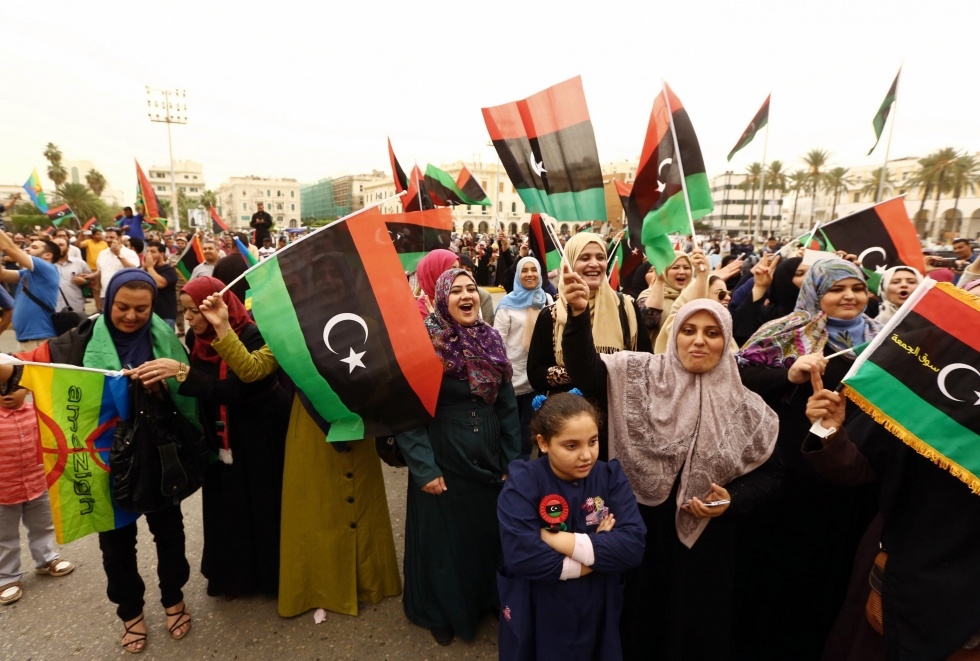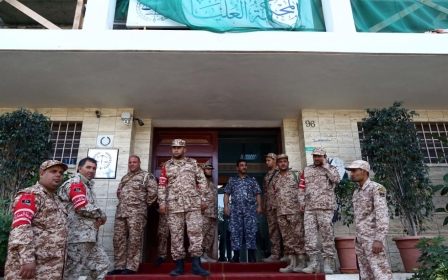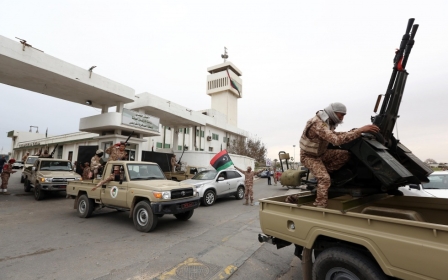Libya parliament rejects court ruling, calls grow for international action

Libya’s House of Representatives (HoR) rejected on Thursday an earlier decision by the Supreme Court in Tripoli that ruled the parliament "unconstitutional", prompting analysts to call on the UN to act decisively and head off a crisis that could lead to partition or further conflict in the troubled North African nation.
The Supreme Court has now ruled against the constitutionality of a decision made by the General National Congress (GNC) in February this year, which had led to elections for the HoR. The ruling now means that the Tobruk-based body, which succeeded the GNC, is now considered illegal by the court.
Supreme Court chief Kamal al-Dahan said the ruling cannot be appealed, adding the decision nullifies the 25 June national poll that elected the HoR.
HoR MP Adam Abu Sakhra later read out a statement on behalf of the parliament, broadcast live on Libya Awalan television, which said the ruling was “taken under the threat of arms” because the capital is “ruled by outlawed militias.”
“The House of Representatives rejects the verdict under these conditions and says it is still functioning, as is the government” he said.
Tripoli was taken over by the Misratan-led Libya Dawn forces in August, where the defunct GNC reconvened with a new government headed by Prime Minister Omar al-Hassi.
A HoR member earlier told MEE the Supreme Court had been guarded by “300 armed militiamen” meaning it had been “impossible for the judges to give any other verdict”.
There has not, however, been any specific evidence produced to back-up claims that the court ruled under duress and Libyan analysts warned against questioning the integrity of one of the country’s last functioning public institutions.
“Some claim the Supreme Court was under pressure but I would prefer to believe the court reached a decision in an environment as reasonable as currently possible,” said Mohammed Eljarh, non-resident fellow at the Atlantic Council's Rafik Hariri Centre for the Middle East. “However, concerns the court has been pressured cannot be overlooked due to the reality on the ground in Tripoli – which is controlled by anti-HoR militias and where there is a self-declared government.”
“But no one can currently prove there has been pressure put on the Supreme Court.”
The GNC, whose mandate expired with the election of the HoR in June, hailed the Supreme Court decision as “a victory for the nation” as supporters of Libya Dawn celebrated in Tripoli as news of the ruling spread. GNC spokesperson Omar Hemeidan told Anadolu Agency the ruling “implicitly grants legal authority” to the assembly.
Eljarh disagreed and said the decision had not automatically conferred authority to the GNC.
“The GNC may see today’s ruling as a victory for them but it isn’t – everyone’s legitimacy is under question at the moment,” said Eljarh. “Hassi’s government in Tripoli was illegally formed – only 20 members met when 120 members are required to approve the prime minister’s appointment.”
Libya’s political crises has seen the country spawn two parliaments, two official news agencies, possibly two central banks as well as countless militias that have been embroiled in heavy fighting across the country.
In a volatile situation, the UN Support Mission in Libya (UNSMIL) responded cautiously to the Supreme Court ruling. The UNSMIL said it will be “studying it [the court ruling] closely” and appealed for all groups to “act responsibly and desist from taking any action that would escalate the existing polarisation.”
One issue UN staff are likely considering is what to do about Libya’s bank accounts. A UN Security Council resolution earlier this year ruled that oil – which provides 95 percent of state revenue - could only be sold by recognised state actors. It is as yet unclear how Thursday’s court ruling will affect international recognition of the HoR.
While the UN considers its response to the shock ruling, some analysts have said it could pave the way for the international body to facilitate an urgently required inclusive dialogue process.
“From the UN perspective it [the ruling] means they can’t treat Tobruk as the sole legitimate government but that could have a positive impact,” said Jason Pack, president of Libya-analysis.com and researcher at Cambridge University.
“The UN may now be able to begin negotiations that already needed to happen – with Hassi’s government, the Misratan Led Alliance of Libya Dawn and the different military groups and commanders who need to be at the negotiating table.”
A conference held in Spain this September and aimed at facilitating dialogue, was criticised for failing to include GNC members and fuelling divisions.
“Tobruk has mismanaged its control of legitimacy. Now is the time for the international actors to reach out to everybody,” Pack said, who recently wrote a report on Libya for the Tony Blair Faith Foundation that urged for Libya not be viewed through an Islamists versus anti-Islamists lens.
The urgent need for facilitated negotiation was emphasised by the response to Thursday’s court ruling, with some angry federalist HoR members saying they will now move to declare a separate state in east and south Libya.
“We are calling a meeting for leaders in eastern Libya and we are going to – maybe - announce a separate government and parliament here,” HoR Benghazi member Abu Bakr Buera told Radio France Internationale. “We cannot make a federal system with such criminals [GNC and Libya Dawn]. No – it will be a separate state in eastern Libya.”
“If our colleagues in the south will plan to join us we can create a new Libya composed of east and south. We will leave Tripoli and Misrata alone – let them enjoy what they are doing.”
Tobruk-based Eljarh said emotions were running high among HoR MPs and called for calm to consider the best course of action for Libya as a whole.
“People need to take a breath and think,” he said. “Partition is more likely than ever right now.”
“The HoR should respond to this decision by calling in the UN to form a caretaker unity government and effectively run Libya in the short-term. Interim authorities could look after the country for five months while a new constitution is drafted and a path forged to take Libya forward positively.”
Cambridge academic Pack, however, took a different view and said the federalists are angling for a better negotiating position, should mediation begin anytime soon.
“The federalists are just having a knee-jerk emotional response – they are not actually going to break off,” he said. “Partition is closer but no one can control their own regions let alone the whole country – the federalists can’t control all of the east.”
“Everyone is manoeuvring to get a better seat at the table and that is what the federalists are currently doing – strengthening their hand when settlement negotiations begin.”
Beyond the political crises fighting in Benghazi rages on, with rogue ex-general Khalifa Haftar’s Operation Dignity forces continuing to battle militias including the US-designated terror group Ansar al-Sharia.
More than 30 people have been killed this week in fierce fighting led by Haftar – a general under former dictator Muammar Gaddafi who fled to exile in the US for nearly 20 years before returning to join rebel forces in the 2011 revolution. He has been accused of seeking political power and heading a counter-revolution backed by UAE airstrikes, facilitated by Egypt – accusations both Abu Dhabi and Cairo have denied.
Amid the ongoing battle for Benghazi Haftar appeared to enter the city for the first time on Thursday since he launched his campaign in October.
Amid the ongoing battle for Benghazi Haftar appeared to enter the city for the first time on Thursday since he launched his campaign in October.
Pack also emphasised that the aim in Benghazi is for Haftar to facilitate a HoR return to the city, after the parliament failed to meet there as constitutionally required and was instead forced to move further east to Tobruk in the summer due to rising violence.
“They are trying all out to try and get the HoR moved to Benghazi as soon as possible in order to declare it as legitimate,” he said. “The fighting is going to intensify in Benghazi – things are very, very bad there right now.”
“Fighting will continue until there is some kind of mediated settlement,” he added, reiterating that the time is now for the international actors to act decisively and move to bring an end to what has become a civil war.
New MEE newsletter: Jerusalem Dispatch
Sign up to get the latest insights and analysis on Israel-Palestine, alongside Turkey Unpacked and other MEE newsletters
Middle East Eye delivers independent and unrivalled coverage and analysis of the Middle East, North Africa and beyond. To learn more about republishing this content and the associated fees, please fill out this form. More about MEE can be found here.




